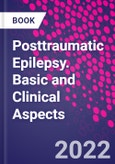Posttraumatic Epilepsy: Basic and Clinical Aspects provides a synthesized resource on the recent basic and clinical science developments in the field of posttraumatic epilepsy. This book provides a clear understanding of the history of studies and epidemiology of posttraumatic epilepsy after head injury. The book also considers the neuropathology of posttraumatic epilepsy and clinical trials of antiepileptogenic agents evaluated after traumatic brain injury. The book covers the basic science of animal models of traumatic brain injury and the necessary and sufficient changes that must occur to generate epilepsy after head trauma. The authors explore potential mechanisms and novel therapeutic approaches to prevent posttraumatic epilepsy. The book is written for basic and clinical researchers in neuroscience as well as for clinicians treating patients with epilepsy.
Please Note: This is an On Demand product, delivery may take up to 11 working days after payment has been received.
Table of Contents
1. History of posttraumatic epilepsy
2. Epidemiology of posttraumatic epilepsy
3. Neuropathology of posttraumatic epilepsy
4. Clinical trials of agents to prevent posttraumatic epilepsy
5. Surgical treatment of posttraumatic epilepsy
6. Animal models of traumatic brain injury
7. Incidence of posttraumatic epilepsy in animal models of traumatic brain injury
8. Cellular and molecular changes in animal models of posttraumatic epilepsy
9. Blood-brain barrier disruption and posttraumatic epilepsy
10. Inflammation and posttraumatic epilepsy
11. Biomarkers and treatment trials in animal models to prevent posttraumatic epilepsy
12. Therapeutic targets and future directions








